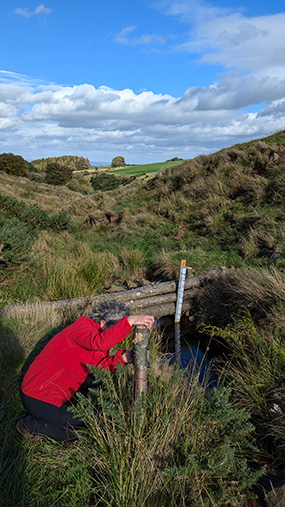Rising waters | Rooted solutions
Flood and Coastal Resilience Innovation Programme Mid-Term Report

The Flood and Coastal Innovation Programme represents the largest investment in innovation ever made by the EA and Defra. Read the programme’s mid-point summary including Ousewem's contributions.
The £200 million Flood and Coastal Innovation Programme (FCIP) represents the largest investment in innovation ever made by the Environment Agency and the Department for Environment, Food and Rural Affairs. Among the 25 projects aimed at developing innovative flood and coastal resilience solutions across England, Ousewem is a proud contributor.
Running from 2021 to 2027, FCIP aims to test, refine, and implement a range of methods to manage flood risks more effectively, reduce coastal erosion, and enhance local climate adaptation. Now at the programme’s mid-point, early successes, challenges, and learnings have been compiled. Find out more, including the headlines, in the FCIP Mid-programme summary.
Ousewem’s role in FCIP and Natural Flood Management
The mid-term report highlights the success of natural flood management (NFM) across rural and urban areas. Projects have partnered with land managers and environmental organisations to create flood control measures like leaky barriers, wetlands, and rain gardens, which use natural processes to slow water flow and reduce flood risk.
Ousewem's approach aligns with this strategy and is working to advance NFM techniques. Through the development of tools specifically for Ousewem, we can estimate the flood mitigation and environmental benefits of interventions. These tools are being applied at pilot sites and will soon be expanded to focus catchments, ensuring targeted work.
With Natural England as a delivery partner, we work closely with the Catchment-Sensitive Farming team, establishing strong partnerships with local landowners, who play a crucial role in NFM success. To further support landowners, Ousewem is developing a farm recompense scheme, to help long-term maintenance of flood management measures.
Key achievements to date
Ousewem’s contributions to the FCIP are aligned with the programme’s broader achievements but also include notable, project-specific progress:
- development of key tools], with one adopted by the Environment Agency for further refinement
- creation of the Ousewem process and grant payment mechanism, ensuring efficient and equitable fund distribution for local resilience measures
- a comprehensive NFM co-benefits review], helping to understand how Ousewem’s efforts can not only reduce flood risks but also enhance public amenities, biodiversity, and community well-being
Looking ahead, Ousewem will play a critical role in securing partner funding, contributing to the wider programme’s ability to address societal challenges like public health and community cohesion.

Challenges and learning
As with many innovative projects in the FCIP, Ousewem has faced challenges in pioneering new approaches. While promising, NFM is still a relatively new approach, and scaling it requires overcoming technical, regulatory, and logistical hurdles. Ousewem shares the experiences of other FCIP projects in navigating complex regulatory frameworks and balancing multiple objectives.
However, Ousewem views these challenges as opportunities for growth. By leveraging the expertise of more experienced partners, Ousewem continues to address gaps in project delivery and procurement. This learning-by-doing approach, central to the FCIP, helps build resilience not only in the environment but also in the operational capacities of the organisations involved.
Next steps for Ousewem
As the FCIP progresses, Ousewem is prepared to take its natural flood management work to the next level. Key next steps include:
- implementing and sharing innovations developed over the past few years, enabling other regions to replicate successful methods
- delivering projects at focus catchments, continuing to test and refine NFM interventions in real-world settings
- ongoing tool development and feedback, using data and monitoring to enhance the effectiveness of flood management
- increasing stakeholder engagement and delivery, ensuring active participation from communities and landowners in flood resilience planning and implementation
- continued monitoring and evaluation to gain insights into the long-term benefits of NFM and inform future policy
Additionally, Ousewem aims to influence national policy by contributing its findings to the broader conversation on flood risk management. Through its involvement in the FCIP, Ousewem is helping to shape future approaches to flood resilience and coastal adaptation across England.
Conclusion
The mid-term report on the Flood and Coastal Resilience Innovation Programme highlights the substantial progress in managing flood risks and enhancing resilience across England. Ousewem is proud to contribute to these innovations, particularly in natural flood management, driving forward sustainable, community-based solutions. While challenges remain, our achievements demonstrate the power of collaboration, innovation, and learning.
As the programme moves into its next phase, Ousewem remains committed to further success and contributing to a more resilient future for all.
Also see

